Codependency within our community is on the rise.
In fact, I’m going to say something controversial. I believe that most of our clients exhibit codependent tendencies.
But more on that in a moment. One thing I’d really like to explore is if codependents move on quickly after a breakup.
In short, no, it takes a long time for codependents to move on after a breakup, and usually even longer to get over someone than someone who isn’t codependent.
This probably seems obvious to you but you’d be surprised at how little people actually think to ask why.
And that’s what I’ll be doing today.
I’ll be asking questions like,
- Why is it so difficult for codependents to move on after a breakup?
- What are the core reasons for this difficulty? (Hint: there are 9.)
Let’s get right to it!

What Are Your Chances of Getting Your Ex Boyfriend Back?
Take the quizWhy It Is So Difficult For Codependents To Move On After A Breakup
First thing, I’d actually like to recommend a book, Women Who Love Too Much by Robin Norwood (And no, that’s not some sort of affiliate link. I just really think if you are going through a breakup you should read it.)
Anyways, I’ve been re-reading the book recently and one of the big points that it makes is that it’s incredibly difficult for codependents to move on after a breakup.
(Shocker, right?)
But take this quote as an example:
“We are attracted to men that replicate the struggle we endured with our parents when we tried to be good enough, loving enough, worthy enough, helpful enough and smart enough to win the love, attention and approval from those that could not give us what we needed because of their own problems and preoccupations. Now we operate as if love, attention and approval don’t count unless we are able to extract them from a man that is not readily available because of his own problems and preoccupations. Terrified of abandonment you will do anything to keep a relationship from dissolving. Abandonment is a very strong word that implies being left possibly to die because we may not be able to survive alone. There is literal abandonment and emotional abandonment. With all the terror and emptiness that implies. As an adult being left by a man who represents those people who first abandoned us brings up all the terror again. Of course we would do anything to avoid that feeling again.”
This is what leads people to codependency.
At the root of it, people-pleasing and helping are used to avoid abandonment and gain attention, approval, and love. Codependents often find healthy, safe men boring.
As Robin Norwood emphasizes, Codependents are drawn to partners who replicate the same struggles they experienced with their parents.
They seek love, attention, and approval from individuals who are emotionally unavailable due to their own problems and preoccupations.
Driven by the fear of abandonment, codependents go to great lengths to preserve relationships, fearing the prospect of being left alone to face the terrifying void and emptiness that abandonment implies.
Even as adults, being left by a partner who symbolizes those who initially abandoned them reignites that deep-seated terror.
And this really paves the way for the extra struggle they’ll face during a breakup.
The Nine Core Reasons For A Codependents Struggle
There are several reasons codependents struggle with moving on from a breakup but I’ve spent the last week trying to widdle those “many” reasons down to just nine.
They are as follows:

What Are Your Chances of Getting Your Ex Boyfriend Back?
Take the quiz- Their happiness is external
- A loss of control
- Their fake self esteem is gone
- Self blame
- They idealize the relationship
- Loneliness
- Fear and anxiety
- Loss of identity
- They were attracted to a narcissist
Let’s dive in to each one.
Factor #1: Their Happiness Is External
Codependent individuals often feel like their worth is tied to being needed by someone else, specifically the enabler in their life.
They believe that their value comes from making drastic sacrifices and going above and beyond for their partner.
On the other hand, the enabler finds fulfillment in having all their needs met by the codependent person. It’s almost like they rely on the codependent to take care of them completely.
And strangely enough, the codependent only feels truly happy when they’re making these extreme sacrifices for their partner.
It’s an intricate dynamic where both sides depend on each other in unhealthy ways. Since they’ve gotten their happiness through their partner the breakup devastated them and they cannot find happiness.
Factor #2: A Loss Of Control
Maintaining a sense of control provides a psychological sense of security for codependents.
This strategy helps them manage their anxiety, creating a feeling of stability in relationships.
Codependents often believe they know what’s best for others and rely on fostering dependence to maintain control.
This control is exerted by dictating what others should or shouldn’t do. Their coping mechanism involves assuming responsibility for others’ lives, actions, and emotions.
They may seek relationships with individuals with low self-esteem, allowing them to take on a rescuer or champion role. When they lose this person, it feels like a part of their identity has been lost.
We’re going to explore this further in upcoming sections.
However, I’d like to highlight a common theme that runs through this article: the similarities between codependency and anxious attachment styles.
As a fervent proponent of attachment styles, I believe they can help explain the behaviors that exes or even you might exhibit post-breakup.
Anxious attachment style, one of the most insecure attachment styles, can be best understood from the perspective of a core wound: a fear of abandonment.
I believe my husband has talked about that in-depth here,
This fear often triggers actions to prevent abandonment, one of which is control.
Jeff Guenther, a couples counselor and therapist, wrote about the link between codependency and the anxious attachment style.
This makes sense, as our internal polls indicate that most of our clients believe they have an anxious attachment style.
Losing control after a breakup often results in panic, exacerbating this core wound which ultimately cause their anxious and codependent tendencies surface even more.
Factor #3: Their Fake Self Esteem Is Gone
It’s crucial to remember that a codependent person often harbors deep-rooted fears of abandonment.
This ties back to the core wound of the anxious attachment style and its relation to codependency I talked about above.
Due to this core wound, they typically struggle with low self-worth for a significant part of their lives.

What Are Your Chances of Getting Your Ex Boyfriend Back?
Take the quizInterestingly, when they enter a relationship, they compensate for their fragile self-esteem by consistently prioritizing their partner’s needs, even when the partner fails to reciprocate.
In essence, their entire self-esteem is externally rooted, which can be viewed as a façade.
Any self-esteem they have is wholly derived from someone else, hence its ‘fake’ nature. However, when the codependent is left by their partner, their ‘fake’ self-esteem dissipates, leaving them feeling even more devastated by the breakup.
Once again calling back to that core wound of the anxious attachment style, the fear of abandonment, being left by a partner aggravates this fear.
If your self-esteem was entirely based on this person, the loss of this ‘fake’ self-esteem triggers a downward spiral, making the breakup seem far worse.
Factor #4: They Blame Themselves
Codependents often tend to attribute relationship issues to themselves, even when the breakup wasn’t wholly their fault.
A glance around our community reveals how widespread this mindset is.
I frequently encounter this during coaching calls, where individuals believe they were the sole problem, despite evidence to the contrary.
Codependents are predisposed to self-blame, consistent with the anxious attachment style, feeling guilty for not making the relationship work or for not meeting their partner’s needs.
Remember in a weird way codependent people are sort of selfless.
They don’t really think about themselves to their own detriment. So it can feel really bad when they feel rejected because, to them, it feels like all the effort and energy they were putting into that other person wasn’t enough.
This kind of thinking leads them to overthink the relationship and the breakup and it makes it virtually impossible to move on.
Factor #5: They Idealize The Relationship
In our community, we’ve seen many people who manage to reunite with their exes, only to outgrow them and decide they no longer want them back.
My husband has interviewed many of these individuals and a common revelation is their ability to see that their relationship wasn’t perfect.
When considering reconciliation with an ex, they tend to focus only on the peak positive moments of the relationship, often ignoring the negatives.
However, when they do get their ex back, particularly if they have worked with us, we strive to help them outgrow their ex before deciding to reunite. Our goal is to ensure you view your past relationship without the ‘rose-colored glasses’, acknowledging its flaws with a clearer perspective.
We also help you recognize your self-worth, diminishing the need for codependency.
Often, when this shift in perspective occurs, clients realize they don’t really want their ex back anymore. They have outgrown their ex. However, the crux is that codependents often struggle with breakups because they tend to idealize and pedestalize their relationships.
Factor #6: Loneliness
The absence of their partner can leave codependents feeling incredibly lonely and empty.
They may have become so accustomed to being in a codependent dynamic that being alone feels unfamiliar and uncomfortable.

What Are Your Chances of Getting Your Ex Boyfriend Back?
Take the quizThis discomfort can often drive them into cycles of self-doubt and anxiety, causing them to question their own worthiness.
In turn, this can lead to a desperate attempt to rekindle the relationship or jump into a new one prematurely to fill the perceived void.
Factor #7: Fear And Anxiety
I’ve already linked codependency to the anxious attachment style. It’s crucial to remember that codependents often harbor a profound fear of being alone or abandoned. This core wound, related to anxious attachment, triggers intense anxiety and fear about their future and their ability to cope without their partner, especially in the wake of a breakup.
My husband frequently refers to his ‘avoidant death wheel’, a graphic that captures the cyclical behavior of individuals with an avoidant attachment style.
Given that most clients at Ex-Boyfriend Recovery have exes with this attachment style, it’s often discussed.
However, when considering codependents, it’s also important to introduce a second cycle, the ‘anxious death wheel’.
- The individual desires love and companionship.
- They find someone they’re interested in.
- They focus their entire attention on this person.
- They start to feel that the person is going to leave them.
- The person leaves them.
- They try everything to win the person back.
- Their efforts are not successful, and they feel alone.
- They question if they will ever find someone.
This cycle can repeat itself, starting again from the first stage.
Codependent individuals frequently find themselves trapped in this loop.
It’s not a healthy dynamic as they not only succumb to their anxiety, but stages five through eight can sometimes take years to cycle through due to the emotional turmoil caused by the breakup.
All this originates from the core wound, the fear of abandonment.
Stage six, where they try everything to win their partner back, is driven by their need to alleviate anxiety.
In their minds, they believe that if they can get their partner back, everything will revert to the way it was. But often, even if they’re successful, they can still feel profoundly alone, which fosters fear and additional anxiety.
This situation creates self-doubt and erodes self-esteem, leading them to believe that they’ll never find anyone else. This keeps them trapped in a downward spiral, from which they struggle to emerge.
Factor #8: Loss of Identity
It’s crucial to remember that codependents often derive a significant portion of their identity and self-worth from their relationships.
Therefore, after a breakup, they grapple with a loss of identity and a sense of not knowing who they are outside of the relationship.
The first parallel that came to mind while researching this topic was the situation athletes often find themselves in.
If you wish to observe this phenomenon in real-time, consider the case of athletes, who I’d wager are often codependent on their careers.
We see evidence of this when many athletes face financial difficulties post-retirement.
In fact, recent research suggests that almost 80% of athletes go broke after retiring.
This is not only because they may lack money management skills, but they also struggle to cope with the world outside of their strict routines, which were designed to optimize their performance in their sport.
When this routine is disrupted, they feel as though they’ve lost their identity, leading them to continue their extravagant spending habits as if they still had multi-million dollar contracts coming in.
As a result, they often find themselves in a financial hole.
This is a similar codependency experienced by individuals who have recently undergone a breakup. They too feel as if they’ve lost their identity, and as you can imagine, it’s incredibly challenging not to obsess over that.
Factor #9: They May Have Attracted A Narcissist
Do me a favor and watch this:
It basically makes the argument that codependents attract narcissists because the codependent is like a mirror image of the narcissist giving the narcissist everything he or she needs.
“Codependents idealize relationships and a narcissist idealizes himself. The codependent devalues herself and the narcissist devalues others.”
This trauma bonded relationship makes it even more difficult for a codependent to move on as well as the devalue, discard cycle the narcissist will put the codependent through.
So, the narcissist literally won’t let the codependent move on and (if you look at the other eight factors) in a lot of ways the codependent doesn’t want to move on.

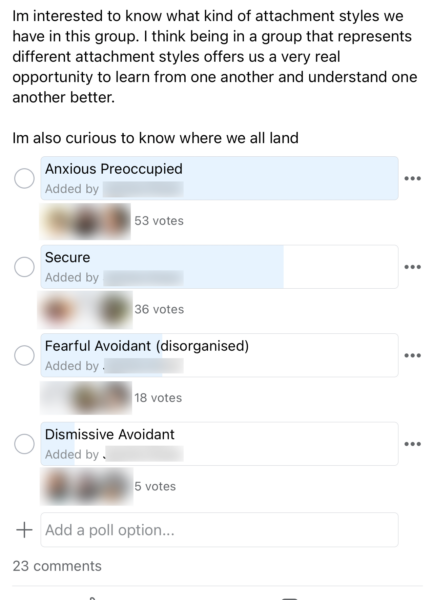

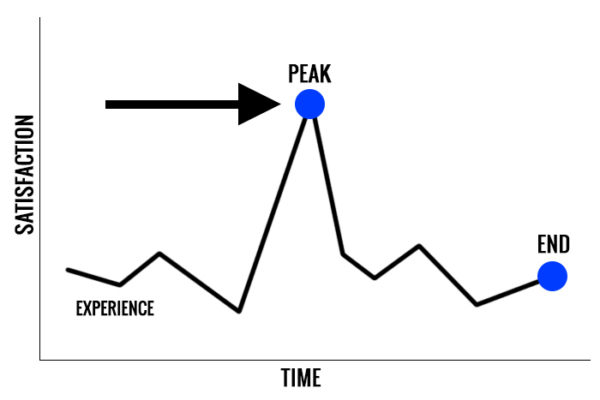
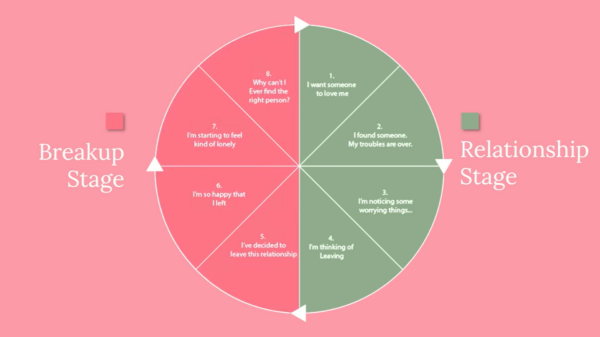

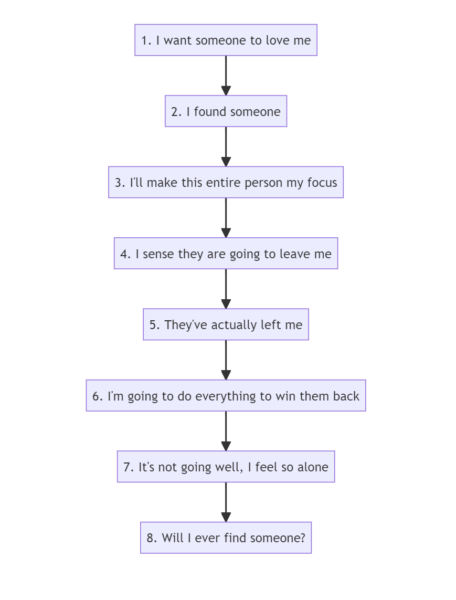
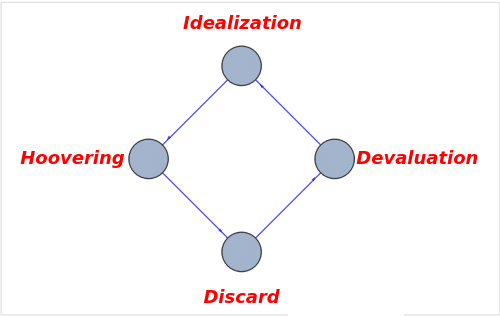
Shannon
August 27, 2024 at 11:27 pm
What’s your take on a codependent ending a relationship and then quickly getting into another relationship?